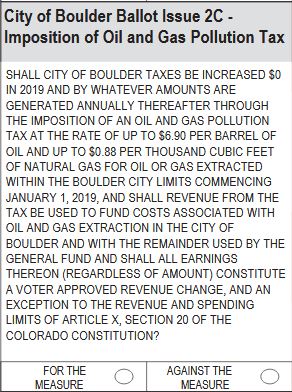Note: This article is the first in a series of 2018 ballot issue analyses written for the Blue Line by author Richard Valenty. You can find coverage of the other 2018 ballot issues here. Ed.
Issue 2C, if passed, would target “externalities,” basically negative physical or environmental impacts, of potential future oil and gas production within City of Boulder limits. It would impose a new oil and gas pollution tax of “up to $6.90 per barrel of oil,” and “up to $0.88 per thousand cubic feet of natural gas.” The revenue is intended to mitigate or offset costs associated with oil and gas exploration within the city, but 2C would also allow any revenue beyond the oil and gas costs to be used in the city’s General Fund.
Beyond 2C, there is a long history of governments imposing taxes or fees on extractive industries that can help pay for damage associated with the industrial activity. Perhaps the best known is the state “severance tax,” and in Colorado some of the severance tax money will be used for local impact grants or natural resource programs. In short, 2C might be a unique type of ballot measure, but the general idea is by no means an “only in Boulder” concept. The tax rates included in 2C are based on a percentage of the “social cost,” which includes considerations of health impacts, climate change, and environmental damage from oil and gas exploration, according to the city memo on 2C.
Readers might wonder, “where is all of this oil and gas development happening in Boulder?” The initial answer is “it’s not,” since the city memo for 2C states plainly that “There are currently no active wells in the city.” But the future’s uncertain, and 2C could make sure there is a city tax in place in case oil or gas exploration comes to town, and this is not necessarily as out of the realm of possibility as it might seem.
In fact, there is an area just northeast of town that was known as the “Boulder Oil Field,” and it was productive for a number of years. There are active natural gas operations not that far away in Boulder and Weld counties, and there is interest for more activity, including on Boulder County Open Space property. For perspective, click this link and enter “Boulder” into the search box to see the location of active or abandoned wells in the area.
Also, this year’s state Amendment 74 could impose penalties on local governments should they enact ordinances to block oil or gas exploration within their jurisdiction. Even if A-74 doesn’t pass, Republican legislators in the General Assembly have regularly been sponsoring bills with generally similar intent to A-74 for the past few years, and while they haven’t passed yet, they might someday.
In short, Boulder has some oil history, there are active gas operations and the potential for more in the county, and the state might someday penalize Boulder for trying to prohibit operations. Issue 2C would not block oil and gas exploration, but could make companies consider if it’s worth operating here, and would make sure the city collects some money for mitigation if operations commence.
Issue 2C Pros and Cons
Pro
- Industrial activity like oil and gas exploration can damage land or impact infrastructure, and the 2C tax would help Boulder mitigate potential damages.
- Even if there is no drilling in Boulder at present, having a tax in place in case of future activity is a prudent move.
- A tax might dissuade oil and gas companies from operating here.
- There are state laws in place that hold oil and gas producers responsible for issues such as negligence or spills, so 2C money would not be the only remedy available in case of problems.
Con
- There is no drilling in Boulder at present, and it doesn’t seem likely in the foreseeable future, so why pass a tax?
- A tax might dissuade oil and gas companies from operating here, costing economic impact or jobs.




 (2 votes, average: 4.50 out of 5)
(2 votes, average: 4.50 out of 5)